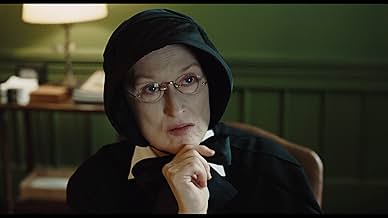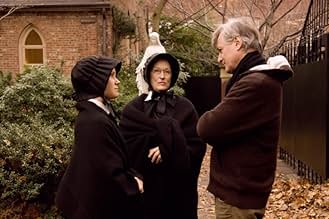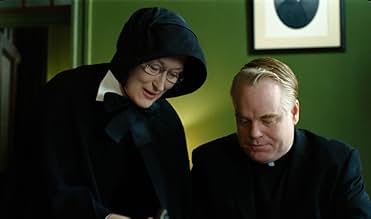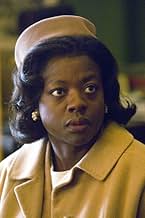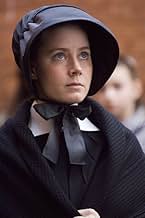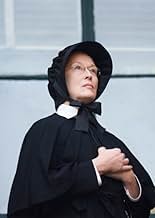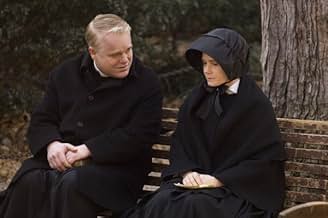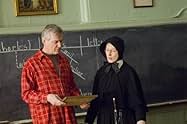Il direttore di una scuola cattolica mette in discussione la relazione ambigua di un prete con un giovane studente dalla vita travagliata.Il direttore di una scuola cattolica mette in discussione la relazione ambigua di un prete con un giovane studente dalla vita travagliata.Il direttore di una scuola cattolica mette in discussione la relazione ambigua di un prete con un giovane studente dalla vita travagliata.
- Regia
- Sceneggiatura
- Star
- Candidato a 5 Oscar
- 25 vittorie e 97 candidature totali
Joseph Foster
- Donald Miller
- (as Joseph Foster II)
Recensioni in evidenza
10kosmasp
And when I say dark, I'm not referring to the clothes in the movie. It's morally ambiguous and it might leave you with more questions than answers, but it's striking nevertheless. The powerhouse performances we get to see in this movie, are worthy Oscar contenders and leave free interpretations as to which character will be to your liking (or which character you despise the most).
While many movies do give you moral clarity, this one plays with many things, that are never fully uncovered ... or maybe they are and I'm just not willing to accept them? Actually it leaves room for some interpretations of things that went down (no pun intended). It's about guilt, it's about doubt and many other things, that makes us human. How you receive the movie might say a lot more about yourself than the movie itself. Which is a great thing. A movie that actually makes you think, even long after the credits finished ...
While many movies do give you moral clarity, this one plays with many things, that are never fully uncovered ... or maybe they are and I'm just not willing to accept them? Actually it leaves room for some interpretations of things that went down (no pun intended). It's about guilt, it's about doubt and many other things, that makes us human. How you receive the movie might say a lot more about yourself than the movie itself. Which is a great thing. A movie that actually makes you think, even long after the credits finished ...
There are no better actors working in American film today than Meryl Streep and Phillip Seymour Hoffman. Streep has been on top for some time now and Hoffman has an unmatched resume of fine performances over the past five years. Pairing off as adversaries in John Patrick Shanley's stage play brought to screen they parry and prod throughout with each landing hay makers along the way.
Change is in the wind in 1964 for both the world and the Catholic Church (Second Vatican Council) as the country moves from conservatism to liberal thought. Sister Aloysius (Streep)is the principal of an inner city Catholic school who rules with an iron fist. Lamenting the loss of tradition (she thinks Frosty the Snowman is a song about worshiping false idols) she crosses swords with the popular and laid back Father Flynn who takes a more liberal view seeing the need to keep up with the times. His progressive ways gnaw at Sister Aloysius and she is soon suspecting Father Flynn of inappropriate relationship with altar boys even though she is without concrete proof.
The scenes between Streep and Hoffman are riveting from start to finish. Both attempt at first to be civil with each other but eventually they end up at each others throat bullying and threatening. It is a titanic emotional struggle that makes for a gripping drama flawlessly acted. I'm no big fan of Streep, finding the adopted accents she employs in some of her films false and hollow, but as the self righteous Nunzilla her pugnacious style and inflection rates with her Sophie's Choice performance. Hoffman has his work cut out for him to keep up with the formidable legend but he holds his own with equal footing.
In supporting roles Amy Adams is very effective as the unintended go between Sister James. Seized with doubt she like the audience mirrors our own misgivings as conflicted objective observers. Viola Davis as a troubled boy's mother has one lengthy powerful and painful scene that begins to tie loose ends together but offers no easy solution.
Writer director John Patrick Shanley does an admirable job in keeping the plot nebulous with ambivalent scenes and peripheral characters that purposefully enhance the suspense. Scenes are tightly edited with sparse but effective dialog giving the film its steady pace. Other than some jarring oblique angle shots the camera compositions and set design provide a somber ambiance for the drama and an arena for the perfectly measured performances by two masters of the craft in this fight to the finish that remains absorbing from beginning to end.
Change is in the wind in 1964 for both the world and the Catholic Church (Second Vatican Council) as the country moves from conservatism to liberal thought. Sister Aloysius (Streep)is the principal of an inner city Catholic school who rules with an iron fist. Lamenting the loss of tradition (she thinks Frosty the Snowman is a song about worshiping false idols) she crosses swords with the popular and laid back Father Flynn who takes a more liberal view seeing the need to keep up with the times. His progressive ways gnaw at Sister Aloysius and she is soon suspecting Father Flynn of inappropriate relationship with altar boys even though she is without concrete proof.
The scenes between Streep and Hoffman are riveting from start to finish. Both attempt at first to be civil with each other but eventually they end up at each others throat bullying and threatening. It is a titanic emotional struggle that makes for a gripping drama flawlessly acted. I'm no big fan of Streep, finding the adopted accents she employs in some of her films false and hollow, but as the self righteous Nunzilla her pugnacious style and inflection rates with her Sophie's Choice performance. Hoffman has his work cut out for him to keep up with the formidable legend but he holds his own with equal footing.
In supporting roles Amy Adams is very effective as the unintended go between Sister James. Seized with doubt she like the audience mirrors our own misgivings as conflicted objective observers. Viola Davis as a troubled boy's mother has one lengthy powerful and painful scene that begins to tie loose ends together but offers no easy solution.
Writer director John Patrick Shanley does an admirable job in keeping the plot nebulous with ambivalent scenes and peripheral characters that purposefully enhance the suspense. Scenes are tightly edited with sparse but effective dialog giving the film its steady pace. Other than some jarring oblique angle shots the camera compositions and set design provide a somber ambiance for the drama and an arena for the perfectly measured performances by two masters of the craft in this fight to the finish that remains absorbing from beginning to end.
In 1964 the winds of change are sweeping through Sister Aloysius' (Meryl Streep) St. Nicholas school. Father Flynn (Philip Seymour Hoffman), a charismatic priest, is advocating reform of the school's strict customs, and the first black student has just been accepted. When a fellow nun (Amy Adams) tells Sister Aloysius that Father Flynn may be paying too much personal attention to the student, Sister Aloysius begins a personal crusade against the priest -- despite her lack of evidence.
A Catholic grade school could seem like a hermetically sealed world in 1964. That's the case with St. Nicholas in the Bronx, ruled by the pathologically severe principal Sister Aloysius, who keeps the students and nuns under her thumb and is engaged in an undeclared war with the new parish priest. Their issues may seem to center around the reforms of Vatican II, then still under way, with Father Flynn (Philip Seymour Hoffman) as the progressive, but for the nun I believe it's more of a power struggle. The pope's infallibility seems, in her case, to have descended to the parish level.
Some will say the character of Sister Aloysius, played without a hint of humor .
Sister Aloysius of "Doubt" hates all inroads of the modern world, including ballpoint pens. This is accurate. We practiced our penmanship with fountain pens, carefully heading every page "JMJ" -- for Jesus, Mary and Joseph, of course. Under Aloysius' command is the sweet young Sister James, whose experience in the world seems limited to what she sees out the convent window. Gradually during the autumn semester, the situation develops.
There is one African-American student at St. Nicholas, Donald Miller, and Father Flynn encourages him in sports and appoints him as an altar boy. This is all proper. Then Sister James notes that the priest summons the boy to the rectory alone. She decides this is improper behavior, and informs Aloysius, whose eyes narrow like a beast of prey. Father Flynn's fate is sealed.
But "Doubt" is not intended as a docudrama about possible sexual abuse. It is about the title word, doubt, in a world of certainty. For Aloysius, Flynn is certainly guilty. That the priest seems innocent, that Sister James comes to believe she was mistaken in her suspicions, means nothing. Flynn knows a breath of scandal would destroy his career. And that is the three-way standoff we watch unfolding with precision and tension.
Something else happens. Donald's mother fears her son will be expelled from the school. He has been accused of drinking the altar wine. Worse, of being given it by Father Flynn. She appeals directly to Sister Aloysius. It lasts about 10 minutes, but it is the emotional heart and soul of "Doubt".
Doubt. It is the subject of the sermon Father Flynn opens the film with. Doubt was coming into the church and the United States in 1964. After the assassination of Kennedy and the beginnings of Vietnam, doubt had undermined American certainty in general. What could you be sure of? What were the circumstances? The motives? The conflict between Aloysius and Flynn is the conflict between old and new, between status and change, between infallibility and uncertainty. And Shanley leaves us doubting. "Doubt" has exact and merciless writing, powerful performances and timeless relevance. It causes us to start thinking with the first shot, and we never stop. Think how rare that is in a film.
I came to a different conclusion seeing this film. The entitled "doubt" was not about Father Flynn's guilt (which I believe becomes apparent toward the end of the film). The "doubt" is manifested in Sister Aloysius as she comes to doubt the institution of the Catholic Church she has devoted her life to. Instead of getting rid of the priest, the church covers up the crime. I think that would be enough to cause anyone to have "doubts". This was the last straw that caused this nun to have an emotional break down, reducing a once rigid woman certain in her beliefs to a sobbing and lost wreck of a human being.
To answer the obvious mystery in the film - whether Father had some sinful (or criminal) relationship with a twelve year boy? The one word answer on the platter is 'Yes'. I don't think the plot of this movie made a lot of sense for its 1964 setting. Would a nun in 1964 really suspect a priest of sexual abuse based on nothing more than a shirt being placed in a locker? In 2018, after two decades of priest abuse stories in the media, sure; however, in 1964, at a time when no one would dare criticize a man of the cloth, I have my doubts. Either way, I did enjoy the film and thought it was well-acted.
As someone who lived this drama (unfortunately in all its aspects), I was transported back in time. The portrayal of Sister Aloysius in particular was stunningly accurate. It was a bit uncomfortable to watch only in that it rekindled those old memories, but the acting was outstanding.
I'm not going to give a long or exhaustive review. A bazillion others have and the movie was released over a year ago--so my giving any sort of in-depth analysis is just needless repetition.
The movie's biggest strength is the acting. All three leading actors did a fine job and this was necessary to carry a film that has no special effects, explosions or love scenes. The vagueness of the film is also a strength. After all, the film gets you thinking and yet there is definitely no clear-cut answer as to what really occurred in the film. There is lots of room to foster discussions and debate. And, while I am a strongly opinionated person, I wouldn't have changed much of the film at all--except the very, very end when Meryl Streep's character, for the first and only time, shows some doubt and emotion. This just didn't seem true to her character. Still, this is a minor concern--and who am I to say, since I didn't win the Pulitzer Prize (last time I checked)! Some may hate the vagueness and want a very clear explanation as to what, exactly, the Father did--if anything. Some may hate that the film actually isn't vague enough (I slightly tend towards that). But what I love about all this is that so many different people see so many different things--mostly based on their own prior experiences and expectations. I could easily see someone seeing gay issues, pedophilia (and it's talked ABOUT but never even explicitly said) or a thousand other possibilities--or it could simply be a metaphor for McCarthyism. Who knows? And that makes the film so interesting.
The movie's biggest strength is the acting. All three leading actors did a fine job and this was necessary to carry a film that has no special effects, explosions or love scenes. The vagueness of the film is also a strength. After all, the film gets you thinking and yet there is definitely no clear-cut answer as to what really occurred in the film. There is lots of room to foster discussions and debate. And, while I am a strongly opinionated person, I wouldn't have changed much of the film at all--except the very, very end when Meryl Streep's character, for the first and only time, shows some doubt and emotion. This just didn't seem true to her character. Still, this is a minor concern--and who am I to say, since I didn't win the Pulitzer Prize (last time I checked)! Some may hate the vagueness and want a very clear explanation as to what, exactly, the Father did--if anything. Some may hate that the film actually isn't vague enough (I slightly tend towards that). But what I love about all this is that so many different people see so many different things--mostly based on their own prior experiences and expectations. I could easily see someone seeing gay issues, pedophilia (and it's talked ABOUT but never even explicitly said) or a thousand other possibilities--or it could simply be a metaphor for McCarthyism. Who knows? And that makes the film so interesting.
Lo sapevi?
- QuizPhilip Seymour Hoffman lobbied for Amy Adams to be a part of the movie, even threatening to leave the project if she wasn't cast.
- BlooperSister Aloysius says the people of ancient Sparta resolved issues by who shouted the loudest. It was actually the ancient Athenians who did that.
People, even nuns, sometimes mix up history facts.
- Citazioni
Father Brendan Flynn: Doubt can be a bond as powerful and sustaining as certainty. When you are lost, you are not alone.
- ConnessioniFeatured in The 14th Annual Critics' Choice Awards (2009)
- Colonne sonoreReginella Campagnola
Written by Eldo Di Lazzaro, Bruno Cherubini (as C. Bruno)
I più visti
Accedi per valutare e creare un elenco di titoli salvati per ottenere consigli personalizzati
Dettagli
- Data di uscita
- Paese di origine
- Siti ufficiali
- Lingua
- Celebre anche come
- La duda
- Luoghi delle riprese
- Aziende produttrici
- Vedi altri crediti dell’azienda su IMDbPro
Botteghino
- Budget
- 20.000.000 USD (previsto)
- Lordo Stati Uniti e Canada
- 33.446.470 USD
- Fine settimana di apertura Stati Uniti e Canada
- 507.226 USD
- 14 dic 2008
- Lordo in tutto il mondo
- 51.699.984 USD
- Tempo di esecuzione1 ora 44 minuti
- Colore
- Mix di suoni
- Proporzioni
- 1.85 : 1
Contribuisci a questa pagina
Suggerisci una modifica o aggiungi i contenuti mancanti




